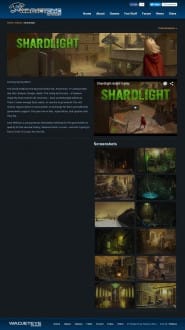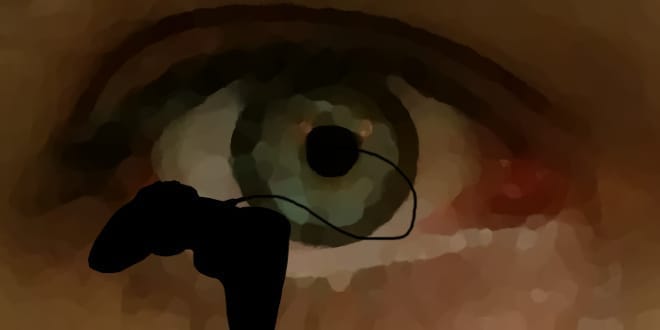I had a blast at Playcrafting's Fall Expo, a game developer event in New York City that gave developers of all shapes and sizes the opportunity to show off their games. Nearly 75 video and board game developers were getting together in one place, and I had the good fortune to be able to attend as press.
An important part of my job is that I'll do research before heading into an event. I want to know about any necessary contacts in case I run into any trouble at the door. I want to be knowledgable about the presenters so that I can make informed questions. And most importantly, I want to know about the products I'm going to look be looking at (whatever they may be).
I did the same for Playcrafting. Every game developer provided a link to represent them on the list of attendees for the event. My research should have been as easy as clicking on that link and reading a little bit about their game or watching a trailer. However, a few of them failed in some critical way one way or another, and I had a difficult time finding useful information about them or their game, and that's if I could find anything at all.
Playcrafting was an open game developer expo event. Anyone could attend it simply by buying a ticket. If I were a game developer, I'd want people to have as much information about my game as I'm comfortable with putting out there. Everyone is a potential customer. There's also the chance of investors and companies scouting out new talent or projects to snap up. And last (but certainly not least), there are journalists such as myself who are looking for interesting things to write about.
Why does this matter to a game developer? Well, Playcrafting's Fall Expo was about three and a half hours long in total. There were nearly 75 developers showcasing their games. It is a simple matter of time. It is literally impossible to see everything unless you only spend a few moments with each game developer. A few minutes is certainly not enough time to find out worthwhile information about an upcoming game. (Indeed, my voice interviews with developers averaged 10-15 minutes and that doesn't include the time with the developers outside of interviewing them directly.)

Journalists, investors, talent scouts, and regular attendees were all bound by the constraints of time. It's a zero-sum game. People such as myself who did their research beforehand had to do a sort of triage—interesting stuff gets seen first and less interesting stuff goes lower down the list. People who didn't do any research were wholly dependent on being attracted by whatever it was the game developer had on display. A company with a big sign advertising their game is going to have better chances of catching the eye of passers-by as opposed to someone with a laptop set up at an empty, lifeless table.
You would think the following tips I'm about to offer would be self-evident. Unfortunately, it seems that for one reason or another there was the occasional game developer at Playcrafting who just wasn't able to provide information in an easily accessible way. And please understand, this is the sort of thing that happens at any kind of industry event; anime conventions will have artist alleys that look very similar. There will be a handful of spectacular displays, a few decent displays, and a smattering of lesser quality efforts on the part of the artists.
Before I press on, please bear in mind that I don't have any sort of special training in marketing or advertising. I am not a game developer myself. I'm simply a consumer. I'm also a journalist, and when I encounter an interesting problem I feel the urge to write about it. The tips I'm offering here (simple as they may be) are coming from a place of wanting to help a game developer or two get attention for their product (and maybe make my job a little bit easier, too).
1. Have some kind of web presence for your game and make the effort to talk about it on social media.

You've heard about a game from a friend and you want to find out more about it. The natural thing to do is Google it and look for the game's website or the developer's Twitter. A web presence (aside from being listed on a storefront) is essential for a game developer.
An indie game developer will have to work with small budgets and low resources. That said, it's never been easier to get a website set up just as it's never been easier to get a video game made by yourself. There are counteless services that offer WYSIWYG systems that make for easy web design for even the most technically illiterate.
There's plenty of options for a game developer on a budget, too. Facebook Pages, YouTube Accounts, Twitter Accounts, and Tumblr Pages are all free and immensely useful for the game developer looking to get the word out at no monetary cost. If someone can't make it to ZorxzlplazSpaceAdventurers dot com, at least they can make it to the Zorxzlplaz Space Adventurers Facebook page.
And don't forget the power of unified branding. If you have the name of your company and/or your game figured out, you should snap up all of the social media accounts that you can with that name. Sometimes you'll be stuck with @ZorxzlplazGame on Twitter or PlayZorxzlplaz dot com and that's understandable, but try to make it all sound roughly the same. Link all of these accounts together in one place so you can build a social media following. Although some people consider social media reach (number of followers on Twitter, number of YouTube subscriptions, etc.) a useless thing, it is definitely something that is valued in the marketing and advertising world. And hey, the more people you can reach about your game, the better!
2. Give people something to look at when they read about your game online, such as screenshots or a trailer.
Once you've established a website and/or a social media presence, you need something to show people. I've seen some very bare-bones websites throughout my life that tell me nothing about the product.
To be fair, game developers have it hard. It's a tricky business—you don't want to show off half-finished work and ruin people's first impression. You don't want to risk a company on the other side of the world putting out a cheap clone of your game before you're even halfway done with yours.
You nonetheless need to have something to show people. The bare minimum should be a text description of your game such as this:
"Zorxzlplaz Space Adventurers is about a swashbuckling trio of rogueish aliens adventuring on Planet Zorxzlplaz. Fly a customizable ship through a harsh world filled with dangerous space pirates and harsh environmental hazards. Land your ship and run around the planet with two other friends in a 3-player co-operative side-scrolling extravaganza!" This imaginary game developer has told me the most important parts of their game in just three sentences.
It's sufficiently vague that it doesn't give too much of the game away, but it gives people something to go on. If I'm really into first person shooters, then I know that Zorxzlplaz Space Adventurers isn't for me. I know it's not a racing game or a real-time strategy. I know it's going to be a side-scroller and I know it's going to have co-op. I can look into the history of the game developer to get an idea of what kind of games they make. Maybe this is something I'd like to play with my friends!
Bare minimums aside, screenshots are much better. Longtime gamers can look at a screenshot and make a lot of educated guesses about what a game is going to be like in terms of its mechanics. They can get an idea of the graphics and the art style, too. These are easy for the game developer to do and cost almost nothing to host, especially if the game developer takes advantage of free image hosting sites. And that person right there is a convert. They're not a sale. No one's a sale until you have their money and they're satisfied enough with your product that they don't return it. But that person knows enough about the game to know whether or not it's something they would be interested in. They'll follow your social media. They'll subscribe to your mailing list. They'll only bail on you once you no longer have their interest.
Screenshots are excellent, but a trailer is better. You don't necessarily have to have a three-minute sensory assault with licensed dubstep music and jump cuts every half a second. If you can produce something nice, sure, go for it. But if you can't, even something as simple as showing off bits of gameplay here and there is worlds better than a static image. Mobile developers may have greater challenges in this respect, but there are apps that can get your phone screen on a PC (such as Samsung's SideSync), which makes recording a mobile game as easy as recording a PC game. If you can't manage that, I would argue that a video recorded of a phone or tablet on a table playing the game would still be better than still images and a bit of text.
As an example to my point, take this trailer for Rebel Galaxy:
https://www.youtube.com/watch?v=HMZPVgycrAE I decided to review Rebel Galaxy based entirely on what the trailer showed me. If I were simply a consumer (and not a journalist), I almost certainly would have bought the game based on what I've seen in this trailer. It tells me absolutely everything I need to know about the game.
3. Playable demos are a step better than just showing your game—the opportunity to try your game might just be the tipping point.
Video games (and board games!) are an interactive medium. You can get a good idea of what a game is like by watching gameplay, but it can never compare to actual hands-on time with the game.
Demos used to be the norm for video games on PC. Magazines like Maximum PC would ship with a CD-ROM filled with demos of all sorts of software and games back in a time when it would take a month to download 700 megabytes worth of data. For one reason or another, demos have become less and less frequent despite the popularity of games trending upward.
There are some who believe that demos can hurt sales. I've never found myself a fan of that logic. If someone plays a demo of your game and they don't buy it as a result, it's probably a good thing. Your best case scenario if a demo didn't exist and they were to follow through with a sale is that you have an unhappy customer. Digital distribution services have been starting to offer refunds (under certain conditions) and that makes it much more likely that an unhappy customer will result in a returned product.
Another argument that I've seen applied against demos is the fact that game developers will front-load a demo with all of their best stuff. You'll play the best level in the game with the coolest boss fight. That shouldn't be a surprise—it's an interactive advertisement that is trying to make a good first impression. If you're going out on a first date or to a job interview you're going to dress nicely and groom yourself. Why should games be any different?

The inconvenient reality is that once your game is released people will probably have access to it for free anyway via pirating. There are people who may want to try a game before buying it and have no legal option to do so. That's something I can understand; I've occasionally found a game that ran terribly despite me meeting the minimum (or even the recommended) requirements. A strange mix of circumstances such as a particular combination of RAM and motherboard can lead to all sorts of problems that a developer couldn't possibly anticipate or prepare for even with a generous QA budget.
The strongest argument against demos from the game developer perspective is the cost. It takes time and money to make what is essentially a game unto itself. Sure, you can just make a branch of your existing code and assets, but there are still all sorts of incidental things you have to set up. There is no "Make a demo from Levels 1-3" button in the SDK. (Not yet, anyway.)
In my mind, a game developer should treat demos like the advertising opportunity they are. The Stanley Parable's demo is a short game that is completely different from the finished product. Even paying customers have a reason to play it.
Ultimately, a demo is the game developer being able to control the true first impression of a potential customer. Your best bet for a sale is dependent on what a customer thinks about your game, so why not make sure you can give them the best first impression possible?
4. Know your game inside and out. Have an answer ready for common questions, even if that answer is "I haven't decided yet" or "I can't talk about that yet."
One of the things that rapidly becomes evident if you ever talk to someone in Public Relations is the rapidity of their responses. They use the phrase "No comment" nearly as often as Mario says "Yahoo!"
There are certain questions that game developers can answer very easily and very quickly. What engine was used to develop the game? How long did you work on the game? What projects have you released before it? Anything relating to the production of the game itself on the game developer side is typically met with a quick response.
However, some equally relevant questions outside of the scope of the more technical work of a game developer can sometimes elicit a stalled response in my experience. Asking a game developer when a game is going to release, what platforms it's going to release on, or how much it will be releasing for are all questions that may result in a delayed response. The problem isn't the inability of the game developer to answer these questions necessarily; a game developer may be bound by NDA or other agreements and simply can't talk about them.
If you are a game developer, you should consider that the following answers are perfectly serviceable when talking to anyone:
- "I don't know yet."
- "I can't talk about that yet."
- "We're under NDA, so we can't reveal any details."
- "We're still working that out."
- "No comment."
It's not impolite. If you genuinely don't know something or haven't decided on it, then you shouldn't feel bad about saying as much. The press will understand. I don't think any AAA game developer is going to feel bad about their inability to discuss a particular topic. I've never had a more polite and assured "No comment" when I asked a couple of 343 employees about the possibility of the Master Chief Collection coming to PC. I'm disappointed, sure, but I don't hold any ill will towards that particular game developer.
5. Attend every event that you can reasonably attend. Be visible, be friendly, and have a playable demo of your game with you.
You have a website, a trailer, and maybe a demo all online for your upcoming game. You talk about it, you send out review copies, and you try to build up hype. What else is there to do for a game developer to get their game seen?
Getting face-to-face with a game developer is always nice. I don't mean this just from a journalistic perspective, I mean this as a regular person, too. It's always cool to meet any kind of artist or creator and be able to talk to them for a few minutes about whatever they're working on.
Humans are social creatures. We prefer the people we know to the people we don't know. If you have ten bucks to spend on a game, I would wager that you would look more fondly on a developer that you met at PAX who was nice to you.
Attending conventions, expos, and the like is probably the most expensive thing for a game developer to do on this list. A display at a big convention like PAX usually starts at four figures and goes up from there. That kind of thing is typically out of the budget for a small game developer.
This is where an indie game developer has to get creative. Any opportunity you have to show off your game to people in person is good. It doesn't have to be a game expo. Local fair? Buy a table for $100, hook up to a generator, and get people to play your game. Visit a local independent game store and see if you can work out getting a demo of your product playable for the customers. Look for smaller events (like Playcrafting) where you can network and show your stuff off among your peers. Get a table at semi-related geek events like a comic book or anime convention. A game developer is by nature a creative person, so use those talents!
All I can do is speak to my own experience. When I went to Playcrafting's Fall Expo I didn't get to speak with every game developer that I would've liked to. I intended to speak with many more but I just didn't have the time. The people I managed to meet are the ones who are getting the articles written about them first out of the simple courtesy of first come, first served. I've been following up with the other developers I missed over the Internet, but they are unfortunately going to have to wait in line (and I've always been sure to let them know this).
If you as a game developer (or future game developer) take anything away from my article it's this: you should make as much information about your game available as possible. The rash of broken day one releases in the last few years has consumers more cautious than ever. An informed consumer will make an informed choice about your product and will probably be a happier consumer. One of the largest factors for determining whether or not I personally buy a game is how much information the game developer has put out there. If there is a lack of information, well ... I've been burned so badly over the years that I suspect that game developer is hiding something.
The market for video and board games has never had so many choices available to the consumer. A game developer can see that as an insurmountable obstacle or they can choose to see it as an opportunity to make themselves stand out. Empower consumers to learn as much as they can about your game, and if it's a good game they're more likely to follow through and buy it.
How do you decide whether or not to buy a game? Does the lack of a trailer or demo make you suspicious of a game developer or their game? Let us know in the comments below!
Have a tip, or want to point out something we missed? Leave a Comment or e-mail us at tips@techraptor.net












